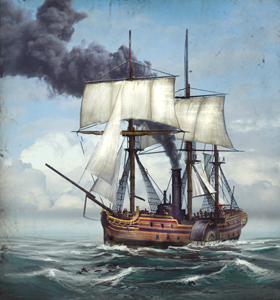Steam Paddle Frigate (NTW unit)
| Steam Paddle Frigate | |||
|---|---|---|---|

| |||
| Faction: | |
| |
| Accuracy: | 60 | 70 | 60 |
| Reloading skill: | 40 | 40 | 50 |
| Hull strength: | 1450 | 1450 | 1510 |
| Speed: | 20 | 21 | 20 |
| Maneuverability: | High | High | High |
| Morale: | 10 | 10 | 12 |
| Turns to build: | 5 | 5 | 5 |
| Recruitment cost: | 1260 | 1380 | 1260 |
| Upkeep cost: | 310 | 340 | 310 |
| Requires | |||
| Technology | |||
| Steam Ship Propulsion | |||
Quick and manoeuvrable, this frigate can sail against the wind thanks to its two enormous paddle wheels.
Carrying powerful 32-pounder cannon, this frigate is a valuable asset to any admiral. At close range, her guns fire a powerful broadside, but this does not make her invulnerable. No frigate has a hull that can withstand a broadside from a ship-of-the-line, and in this case the paddle wheels are vulnerable too. While a paddle-wheel powered frigate is not entirely at the mercy of the wind, it is not possible to carry enough fuel to cruise over long distances; steam is a tactical advantage, not a strategic one.
Paddle wheels were a logical reversal of the idea of a waterwheel, simply reversing the idea of the water flowing past the wheel and providing energy. They were originally used in river-going craft, and it was not until 1819 that the first seafaring paddle-wheel ship, SS Savannah, made the first steam-powered crossing of the Atlantic, from Savannah, Georgia, to Liverpool in England. Savannah did run out of fuel off Ireland, but eventually made landfall and then, after refitting, pressed on to St. Petersburg in Russia, where the Tsar's government was so impressed that it made a cash offer for the ship. The valuation wasn’t good enough.
Available for:
| |
|
|
|
|